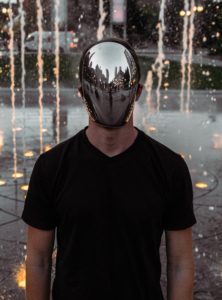I’ve been thinking about authenticity during the last couple of weeks.
What, exactly, does it mean?
Oxford Online Dictionary defines it as the “quality of being genuine or real.”
It seems simple enough, until one pauses to think about what “real” means, especially in the current cultural and political context of “alternative facts” and disinformation.
Recently I went through all my old photographs from the days when we took our film somewhere and had it developed. As I thumbed through photos of the first fifty years of my life, looking at all those younger versions of myself in the context of family, friends, and places, I was struck (not for the first time) by how one-dimensional a photograph is. One single moment in time recorded visually. As I was there when the picture was taken, I remember the emotional context of those recorded moments, the relationships, the quality of my experience; but showing the pictures to someone else is like taking the cover off a book and trying to convey the story with just that.
We know this, yet we continue to take selfies and be utterly seduced by pretty pictures, nowadays filtered, air-brushed, and otherwise enhanced. Some part of us believes in that fantasy, envies it, longs for it.
Is a picture authenticity?
No, of course not. But my pictures do record visual moments in a real life: My childhood, long-dead pets, family, trips, school years, my first job, my first day at college, and my years raising two sons. A real person experienced all that, but not quite the same real person I am today.
Authenticity, then, changes as we change. We age, we grow, we learn, people around us come and go, we move from place to place.
I think of authenticity as a positive quality, one to aspire to and practice. I admire real people, and find them attractive. In some relationships, however, practicing authenticity is dangerous and severely punished. When children repeatedly experience negative consequences for their authenticity, they are effectively crippled in their ability to self-express and form healthy attachments. In order to survive emotionally, they create a pseudo self.
For some, being real or genuine is a horrifying risk. Here is a quote from Patricia Evans, author of Controlling People:
“I have heard many people … say that even when they use all their strength to maintain patience, to carefully articulate their truth, to share their deepest feelings, to explain their personal reality … they don’t receive understanding but instead encounter disparagement, subtle trivializing, or outright rage. People with excellent communication skills, sensitivity, and honesty can’t “get through.” … the Controller experiences this depth of authenticity as an enormous assault.”
When we are children, our sense of self is curated by the adults around us. Too many children internalize relentless criticism and contempt from their caregivers and carry it into adulthood in the form of a vicious internal critic. In this case, what feels like authenticity becomes a lie based on negative beliefs. The genuine, worthy human being is invisible, especially to him or herself, under a crust of trauma and abuse so old it feels real. Ironically, a palliative for this is to risk authenticity with a healthy other and be able to hear a challenge to the false beliefs obscuring our true selves. Sometimes a loving, compassionate onlooker can see us much more clearly than we see ourselves.
I found an article in Psychology Today about authenticity that was thought-provoking. The author lists qualities of authentic people, including emotional intelligence, the ability to learn, and being able to perceive reality.
Perceiving reality has become an enormous cultural problem recently, as you may have noticed! It makes sense that a person practicing authenticity must be able to recognize what’s real and genuine externally as well as internally.
Being authentic sounds so easy. A simple choice. I haven’t realized before writing this post how difficult it is. We can’t choose it if we don’t know what it is, and discovering what’s real, both inside and outside us, is a daunting challenge.
Authenticity is approached by many paths. The practice of minimalism is one. Peeling away layers of stuff and clutter leads to peeling away toxic habits, thoughts, feelings and beliefs, which helps us peel away weight, addictions, dysfunctional relationships, and a multitude of other unhealthy debris.
Another road to authenticity is creativity. I myself discovered decades ago I’m incapable of expressing anything but truth in my writing, particularly journaling for my eyes alone. Our creative work can expose our deepest selves.
Yet another path is emotional intelligence and healing old trauma. The habits of mindfulness and self-inquiry, the willingness to reveal our scars and wounds and express the truth of our experience to others, help us discern the difference between who we really are, who someone told us we are, who we’re afraid we are, and who we wish we could be.
As I work on my new site (yes, yes, it’s coming!), one of the things I’m working with is reorganizing and recategorizing my content, which amounts to 250 posts. Going through all this content chronologically, starting at the beginning with my first post during the summer of 2016, has been a fascinating and lengthy process. Each post is entirely authentic, but I can clearly see change and progress from week to week, month to month, year to year. The woman who wrote that first post is not quite the woman who writes this one. Yet both are (were) practicing authenticity.
I can’t think of anyone more authentic than a newborn baby. Maybe life is a journey from a state of absolute, completely innocent authenticity, through chaos and identity confusion and enormous cultural and societal pressures, and gradual reclamation of who we were born to be, less innocent, but more fully ourselves, as we grow old.
Certainly, I feel more authentic in this moment than I did when I wrote my first blog post. Will I be more authentic yet in a year? In two years? In five?
Interestingly, my new site says “A Journey Into Power” on the landing page, and authenticity is one of my categories. To be seen, heard, and loved for our real selves is a core human need, a longing we all share.
© 2021 – 2023, Jenny Rose. All rights reserved.



